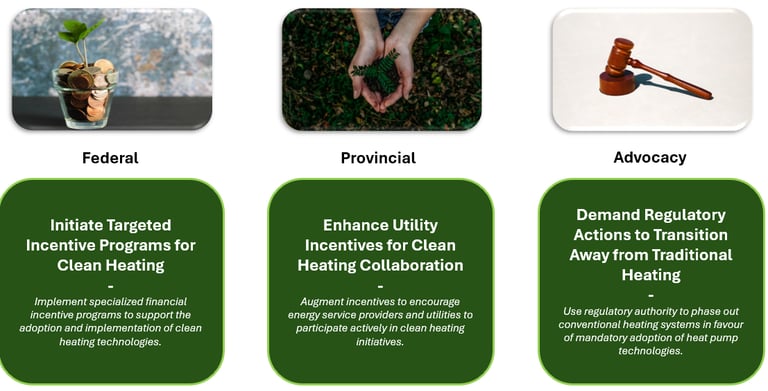

A comparative analysis of Toronto's and Calgary's clean heat technology and policy landscape.
Advancing Clean Heat Policies for Building Decarbonization
Duration
Role
Type
Methods
4 Months
Project Lead, Economic Analyst, Environmental Analyst
ComparativeStudy
Primary and secondary research, scenario modelling, economic analysis.
Link to File
Click Here
Project Collaborators: M.A. Amir Ahsraf Vaghefi & M.Eng. Dhrumil Umeshbhai Khatri
Overview
This study evaluates clean heat policies and technologies in two distinct provincial contexts: Toronto, Ontario, and Calgary, Alberta. It explores the political, technical, and socio-economic factors influencing the adoption of clean heat technologies, specifically air-source and ground-source heat pumps, and their potential impact on building decarbonization efforts. Through comparative analysis, the study identifies effective strategies tailored to each region's unique energy landscape, providing recommendations for stakeholders to advance Canada's transition to net-zero by 2050.
Timeline
A comparative framework was used to assess the technological, political, and environmental aspects of clean heat adoption in Toronto and Calgary. The study involved a combination of political, social, technical, and economic analyses, supported by energy modeling and policy evaluation tools. Recommendations are grounded in the regional energy profiles, building types, and stakeholder engagement practices of each city.
Methodology



Figure 3. Comparison of energy bill savings associated with various heating technologies, Alberta.
Figure 2. Comparison of energy bill savings associated with various heating technologies, Toronto.
Research Implications
The findings highlight key opportunities to decarbonize building heating in Toronto and Calgary. Toronto's established environmental policies can serve as a model for regions like Alberta, where clean energy adoption is still in its early stages. The study also emphasizes the importance of tailored policy development, financial incentives, and public engagement in ensuring the widespread adoption of clean heat technologies across Canada.

Results of Economic Analysis


Policy Recommmendations


